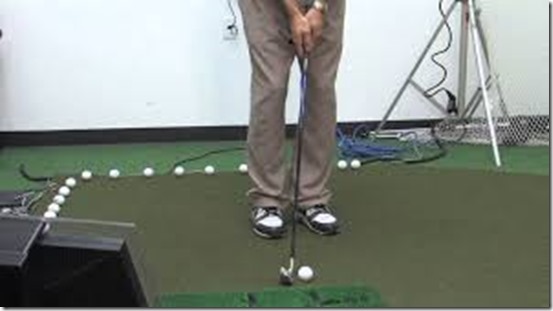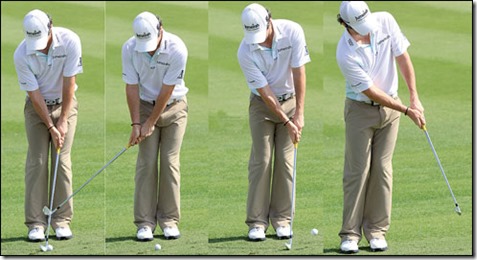Chip and Run (Bump and Run) –Simplified
The ‘chip and run’ (aka ‘bump and run’) is one of the easiest shots in golf – or so everyone kept telling me. Frankly, it took me a while to master this shot – not because it was difficult – but because it was different from every other golf shot.
The primary difference here is that there is NO WRIST BREAK (or a very minimal one, if at all). With all shots, including bunker saves, the hinging of the wrists helps provide the power through impact (as the wrists unhinge through the ball).
In the Chip and Run, instead of a wrist break, all that is required is a gentle shoulder ‘rocking motion’, while keeping the wrists pretty much out of the action.
The Setup
The setup is so simple – that I was mad at myself for having missed it all these years. All this talk about ‘weight on the front foot’ etc..was all very misleading.
The basic idea is to Open your Hips – open to the target line.
As you open your hips, your shoulders try to follow. However, you must keep/adjust your shoulders pointing parallel to target line.
This bears repeating – hips are open to target line, shoulders are square to target line. This is the key setup required to hit bump-and-run shots.
That’s all there is to it. The ball needs to be positioned directly opposite your RIGHT foot – not in the center as it would be for pitches or higher lobs. This ball position will ensure that a gentle shoulder sway will catch the ball on the downwards path of the club.
In addition, it helps to grip down on the club and close the clubface slightly – since you are standing much closer to the ball.
Setup Recap
- Grip down on the club. Close the clubface slightly.
- Position the ball opposite your right foot.
- Open your hips to the target line.
- Square your shoulders to the target line.
With a little practice, this setup will become second nature to you. Once you master this setup, the actual swing is the simpler part of this shot.
The SWING
As mentioned above, all that one has to do is gently rock the shoulders – back and through – with minimal or no wrist break. Watch Rory illustrate this in the image below. Before you start your shoulder movement, it helps to visualize how far back you want to go (depending on how far the ball needs to travel). Once you have the ‘how far back’ figured out, all you have to do is make your forward stroke the same length. Same length back – same length through! That’s actually a good mantra for all short game shots- including putting and half/partial wedge shots.
Same length back – same length through – has saved me on the putting green as often as it has on this basic ‘bump and run’ shot. Especially on those really short, treacherous putts – the 3-6 footers that can run by the hole if you hit them too hard, this simple maxim can be a life saver.
Just remember – only go back far enough to get the ball to the hole – and then, ensure your ‘through stroke’ is the same length (see how Rory ‘holds the finish’ – if you rock your shoulders gently, you should have the same look on your follow-through) .
Getting out of divots and dry lies
An additional advantage of this simple shoulder-based chipping motion is that you can chip out of bad lies as easily as good ones. If your ball is in a divot (or on sandy ground or dry ground or even pine needles…), all you need to do is close the clubface some more. This will ensure that the ball makes solid contact with the center of the clubface – even if the clubface has to ‘dig down’ into the divot a little.
Summary
The basic ‘chip and run’ or bump and run shot in golf – is really just that – very basic. It is also one of the most useful shots – called into play by amateurs and pros alike.
The simplicity of the shot lies in realizing that it is no more than a gentle shoulder ‘rocking motion’ – without any wrist break. To enable solid contact with this shoulder motion, simply place the ball back in your stance and grip down on the club. Your hips need to be opened up to the target line – while keeping your shoulders square.
It works equally well out of crappy (e.g. divot) lies – as it does out of good lies.
Try it out and let me know how your chip and run shots work.
Some Questions and Clarifications
Based on a few questions on this post, here are a few clarifications.
Q) Which club should I use?
A) Basically, for longer chips, use an 8 iron. For shorter chips, use a PW. For intermediate lengths, use the 9 iron. To get a good idea of how far (the range) that each club will work for – you will need a little practice.
Q) How much should I grip down on the club?
A) Grip down till your arms feel straight and extended. Your arms should feel ‘like they are fully extended’ – as your shoulders line up with the target line. The extended arms is what allows your shoulders to engage – and allows you to keep your wrists out of the swing.


Leave a Reply